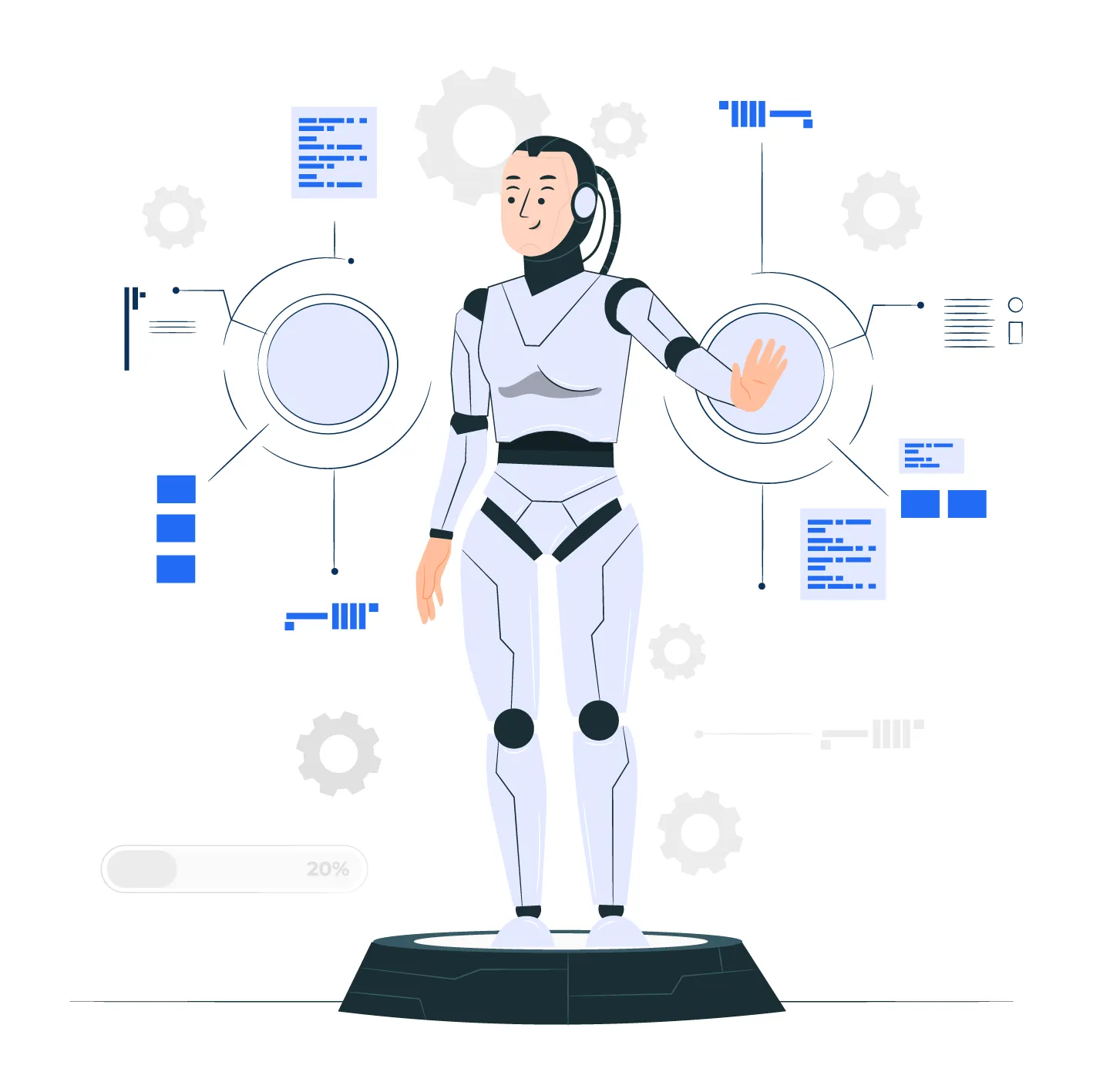What is Strong AI?
Strong AI is a type of artificial intelligence that can perform any intellectual task that a human can. This includes tasks that require reasoning, problem-solving, creativity, and social intelligence.
Characteristics of Strong AI
The key characteristics of Strong AI include general intelligence, flexibility, adaptability, and creativity.
Strong AI is designed to learn from experience, improve its performance over time, and make decisions based on complex data sets.
Examples of Strong AI
While Strong AI is still in its early stages of development, there are several examples of Strong AI systems in use today.
These include virtual assistants like Siri and Alexa, autonomous vehicles, and robots that can perform complex tasks like surgery and manufacturing.
How does Strong AI work?
Everything follows a procedure so here does how Strong AI works
Neural Networks
One of the key technologies behind Strong AI is neural networks. Computer systems called neural networks are created to mimic how the human brain operates.
It uses layers of interconnected nodes that are able to learn from data and develop over time.
Machine Learning
Another important technology for Strong AI is machine learning. Machine learning algorithms enable machines to learn from data and improve their performance over time.
This includes supervised learning, unsupervised learning, and reinforcement learning.
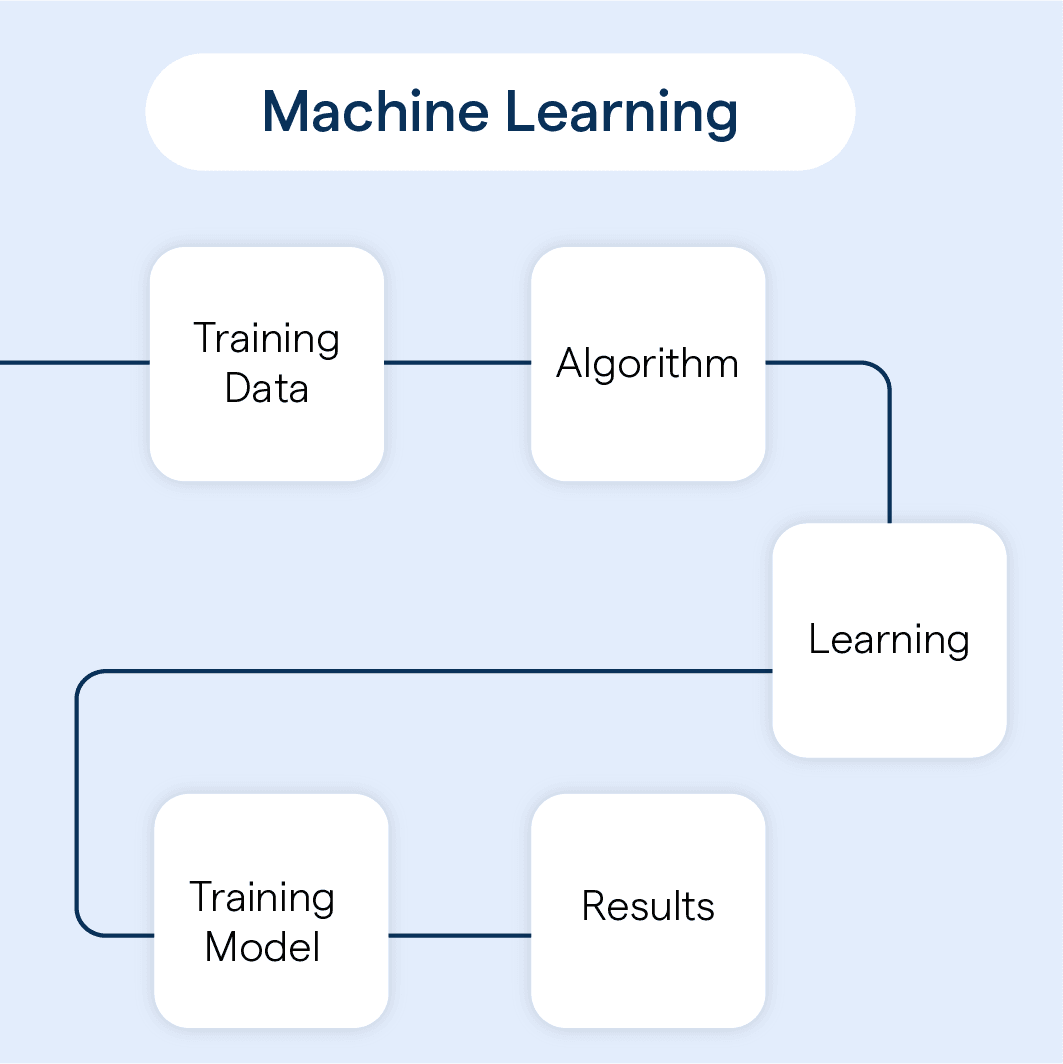
Natural Language Processing
Natural language processing (NLP) is another key technology for Strong AI. NLP enables machines to understand and interpret human language, including text and speech.
This allows machines to interact with humans in a more natural and intuitive way.
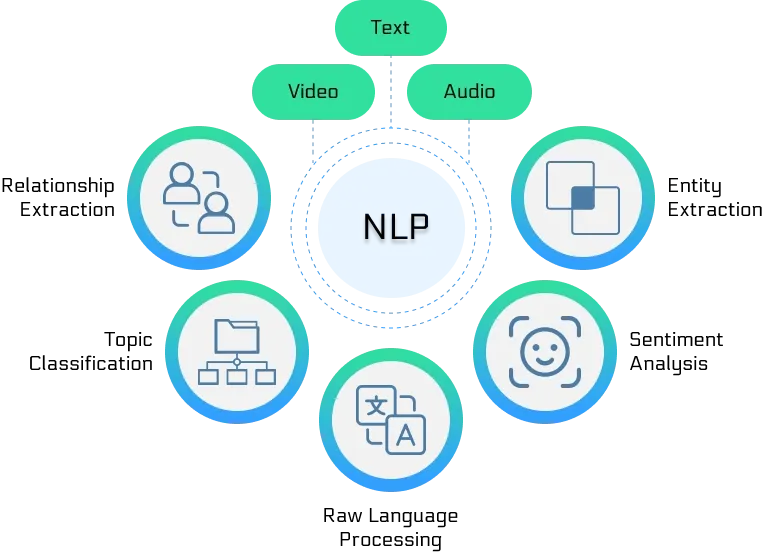
Robotics
Strong AI also relies on robotics technology. Robotics enables machines to interact with the physical world, performing tasks like lifting, moving, and manipulating objects.
Robotics is essential for applications like manufacturing, logistics, and healthcare.
Computer Vision
Finally, computer vision is a critical technology for Strong AI. CV enables machines to interpret visual data from cameras and sensors.
This allows machines to perceive their environment and navigate it safely and efficiently.
AI helps in automation too, Try various automation possibilities with BotPenguin.
Differences between Strong AI and Weak AI
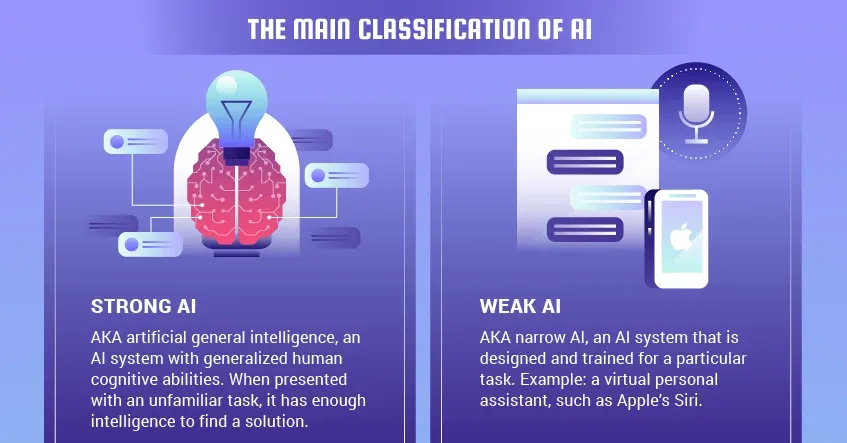
Strong AI and Weak AI are two different types of artificial intelligence that differ in their capabilities and application. The key differences between Strong AI and Weak AI are as follows:
Definition
Strong AI is a type of artificial intelligence that can perform any intellectual task that a human can. It is also known as artificial general intelligence (AGI).
In contrast, Weak AI is designed to perform specific tasks in a limited domain.
Capabilities
Strong AI replicates human intelligence and can perform a wide range of tasks that require reasoning, problem-solving, creativity, and social intelligence.
In contrast, Weak AI is designed to perform specific tasks in a limited domain, such as speech recognition, image classification, and NLP.
Flexibility
Strong AI is flexible and adaptable, capable of learning from experience and improving its performance over time. It can handle a wide range of tasks and can make decisions based on complex data sets.
Weak AI, on the other hand, is less flexible and adaptable, designed to perform specific tasks in a limited domain.
Autonomy
Strong AI is autonomous and can operate independently without human intervention. It can learn from experience and make decisions based on data, without the need for human input.
Weak AI, on the other hand, requires human input and supervision to perform tasks.
Application
Strong AI has the potential to revolutionize the world by automating a wide range of jobs, improving decision-making, enhancing efficiency, and lowering costs. It has applications in industries such as healthcare, finance, transportation, manufacturing, and education.
Weak AI, on the other hand, is designed to augment human intelligence and has applications in areas such as virtual assistants, recommendation systems, and spam filters.
General Intelligence
The main difference between Strong AI and Weak AI is that Strong AI is designed to have general intelligence, which means it can perform any intellectual task that a human can.
Weak AI, on the other hand, is designed to perform specific tasks in a limited domain.
Advantages of Strong AI
Different Advantages of Strong AI-
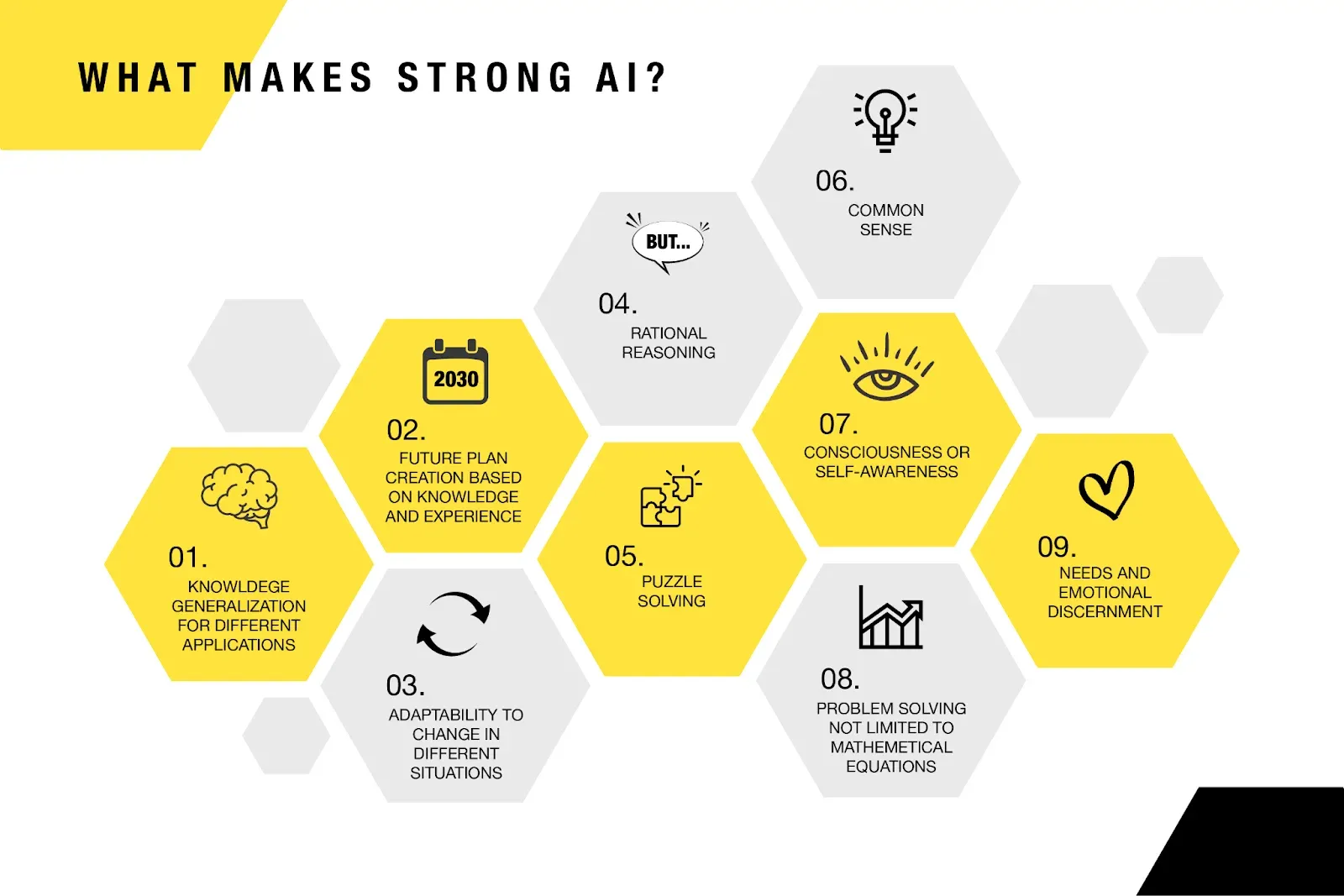
![]() Automation
Automation
Strong AI has the potential to automate a wide range of jobs, from manufacturing and transportation to healthcare and finance.
This can lead to increased productivity, lower costs, and improved efficiency.
Enhanced Decision Making
Strong AI can analyze vast amounts of data and make complex decisions based on that data.
This can lead to improved decision-making in industries like finance, healthcare, and manufacturing.
Improved Efficiency
Strong AI can optimize processes and workflows, leading to improved efficiency and reduced costs.
For example, Strong AI can be used to optimize manufacturing processes, reducing waste and increasing productivity.
Lower Costs
By automating tasks and optimizing workflows, Strong AI can lead to lower costs for businesses and consumers.
This can make products and services more affordable and accessible.
Increased Safety
Strong AI can be used to improve safety in industries like healthcare, transportation, and manufacturing.
For example, Strong AI can be used to monitor patients in hospitals and alert healthcare professionals to potential issues.
Ethical Considerations
Ethical considerations one should keep in mind while working with Strong AI
Concerns about Job Loss
One of the biggest concerns about Strong AI is the potential loss of jobs as machines become capable of performing tasks that were previously done by humans.
This could lead to widespread unemployment and social unrest.
Privacy Concerns
Strong AI has the potential to collect vast amounts of personal data, raising concerns about privacy and surveillance.
This data could be used to target individuals with personalized advertising or to make decisions that impact their lives.
Security Risks
Strong AI could also pose security risks, as hackers and other malicious actors could use it to gain access to sensitive systems and data.
This could lead to cyber-attacks and other security breaches.
Bias and Discrimination
Another concern about Strong AI is the potential for bias and discrimination.
If the data used to train Strong AI systems is biased, the resulting algorithms could perpetuate that bias and discriminate against certain groups of people.
Applications of Strong AI
There are various applications of Strong AI such as
Healthcare

Strong AI can be used to improve patient outcomes and reduce costs in the healthcare industry. For example, Strong AI can be used to monitor patients and detect potential health issues before they become serious.
Finance
Strong AI can be used to automate financial analysis and trading, leading to improved efficiency and reduced costs. It can also be used to detect fraudulent activity and improve risk management.
Transportation
Strong AI can be used to improve safety and efficiency in the transportation industry. For example, Strong AI can be used to optimize traffic flow and prevent accidents.
Manufacturing
Strong AI can be used to automate assembly lines and reduce defects, leading to improved efficiency and lower costs.
Education
Strong AI can be used to personalize learning and improve educational outcomes for students. For example, Strong AI can be used to analyze student data and recommend personalized learning plans.
Challenges in Developing Strong AI
Various Challenges in Developing Strong AI
Technical Challenges
Developing Strong AI presents several technical challenges, including developing algorithms that can handle complex tasks and building hardware that can support the massive computational power required for Strong AI.
Data Limitations
The development of Strong AI requires vast amounts of high-quality data to train machine learning models. However, such data may not always be available or accessible.
Regulatory Issues
Strong AI raises several regulatory issues, including concerns about safety and privacy, and the need for ethical guidelines to ensure that Strong AI is developed and used responsibly.
Funding and Investment
Finally, funding and investment are critical for research and development efforts aimed at advancing Strong AI. Without sufficient funding and investment, progress in the field of Strong AI could be limited.
Future of Strong AI
The upcoming abilities with Strong AI
Potential Advancements
The future of Strong AI is both exciting and uncertain. Advances in technology are expected to lead to significant improvements in the capabilities of Strong AI systems.
For example, researchers are working on developing new types of neural networks that can better mimic the human brain, as well as new algorithms that can handle complex tasks like natural language processing and decision-making.
Societal Impact
Strong AI has the potential to transform the world, with the potential to automate a wide range of jobs and improve decision-making in industries like finance, healthcare, and transportation.
However, it also raises significant ethical concerns, including concerns about job loss, privacy, security, and bias and discrimination.
Legal and Regulatory Considerations
As Strong AI becomes more prevalent, it will be important to establish legal and regulatory frameworks to ensure that it is developed and used responsibly.
This includes the development of ethical guidelines, data privacy laws, and regulations around the use of Strong AI in sensitive industries like healthcare and finance.
